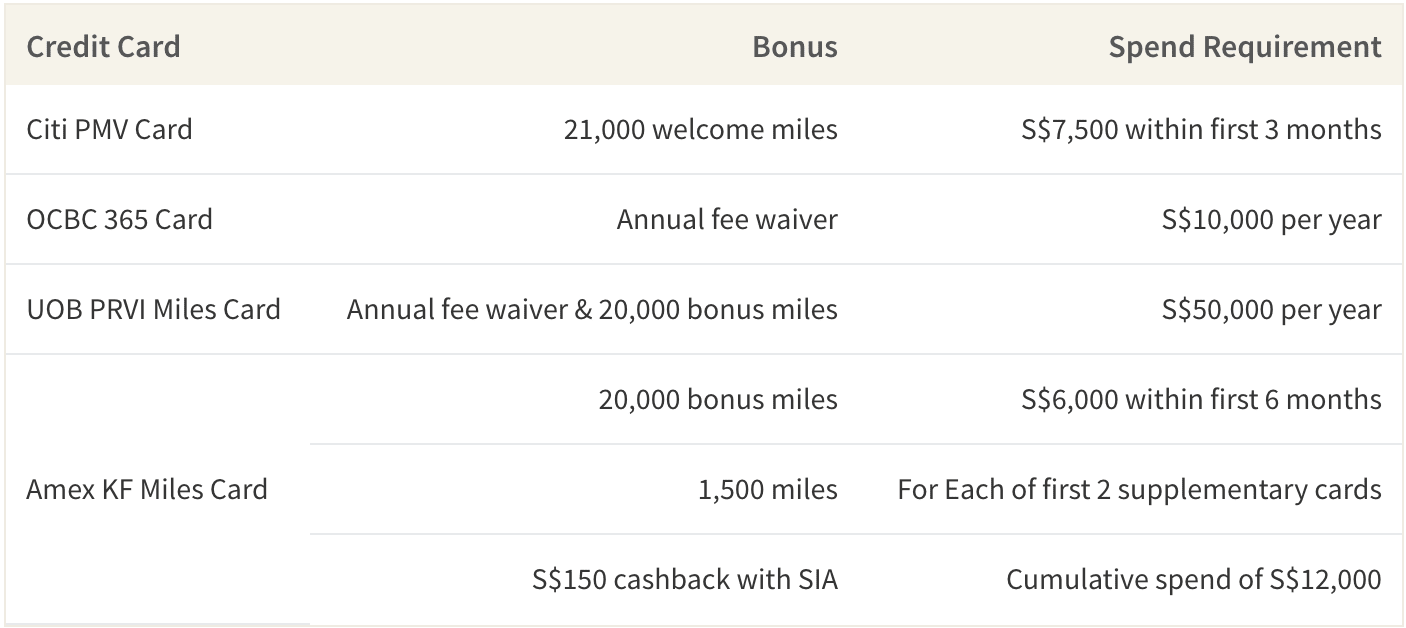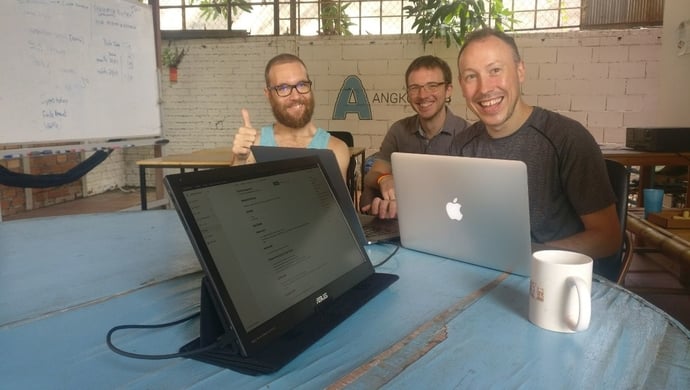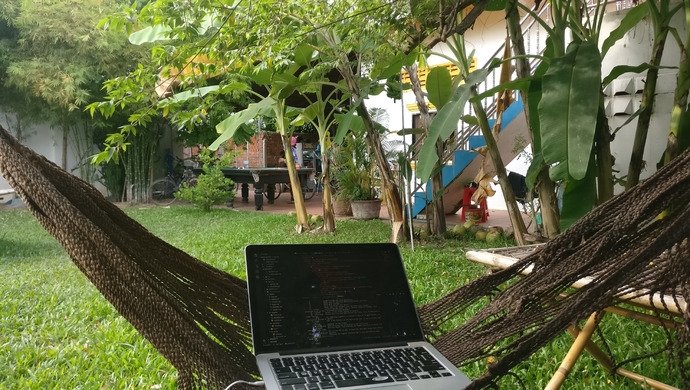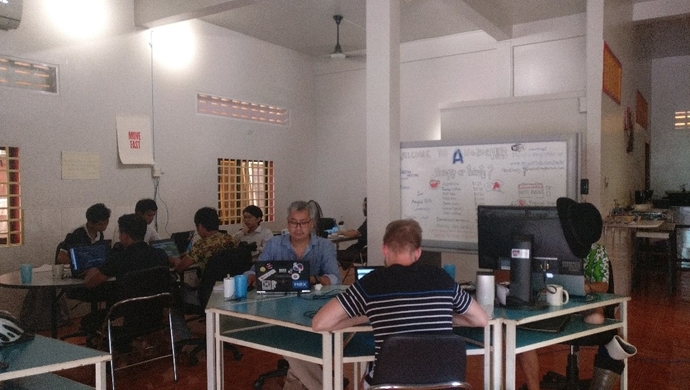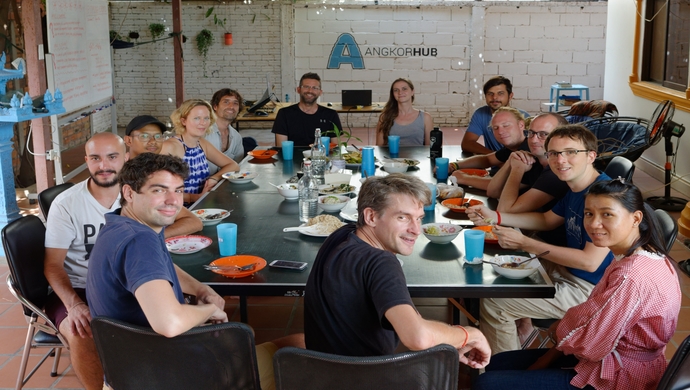From the scarcity of furnitures, to the limited government’s support, Jeff Laflamme has seen it all and still run AngkorHub for almost six years now

Back when it was cool to be a digital nomad, Jeff Laflamme, like the rest of us, sure had been intrigued by the lifestyle that it offers. Ditching his-9 to-5 job at that time, he landed in Ho Chi Minh City, Vietnam, when he bumped into a friend who told him about Siem Reap, south of Cambodia.
This friend introduced him to the idea of co-working space, at that time was one of the firsts in Vietnam, and Laflamme stumbled upon an AHA moment that became the preconception of AngkorHub, the first tech hub in the heart of the touristy city of Cambodia, Siem Reap.
Selling romanticised lifestyle
“It was really like the classic story of a digital nomad. I just got tired of the 9-to-5 routine,” said Laflamme.
Even so, Laflamme admitted that he realised how romanticised the nomadic lifestyle really was. “It sells the idea of working on your laptop with the beach view, remotely in an island with espresso on your table, but it was really interesting and people bought into the idea,” said Laflamme.
The reality, he added, was really trying to find a stable internet connection to be able to work for only a few hours at once. However, this seemed ideal.
Also Read: E-commerce Trends in Singapore to look forward to in the Year of the Pig
So Laflamme thought to himself, why not setting up one in Siem Reap, where tourists are flocking for the beach. “At that time I was really intrigued with co-working space industry and I fell in love with Siem Reap,” he explained.
Quickly he got to work. “I start comparing the situation, numbers, and average wages in Cambodia, especially in IT sector compared to other countries,” said Laflamme.
Challenging feat
He decided that the co-working space he was going to build should be approached with social enterprise concept. “I told myself that we can reuse the same space for training businesses that come to the place. So immediately I worked on a business plan and joined force with someone,” Laflamme added.
Laflamme proceeded to meet with a local who showed him buildings, something that he recalled was like a countryside project.
“There was no stable internet connection at that time, so that was my first challenge in setting up a tech hub, aside from how limited the buildings that are decent enough and being leased to be a place for a co-working space,” said Laflamme.
In addition to that, Laflamme remembered that it was exactly on August 2013 and Siem Reap was still the second poorest province in Cambodia at that time.
He mentioned other challenges like sourcing materials like furnitures to really create a comfortable and inviting co-working space. “You can’t find anything that fits. Sourcing it from Thailand was the closest you could get to a nice interior at that time,” he added.
“I remembered visiting the capital just recently and I was shocked seeing all the infrastructure and materials like furnitures to fill up co-working space that to me doesn’t look like it is in Cambodia,” he recalled.
Next comes the administration.
“Registering business, going to Ministry of Commerce, only to find that they didn’t speak English and they don’t have forms. I remember the guy that was there brought me to another city just to do the paperwork. It was all complicated and there was zero information online,” Laflamme told e27.
After what seemed like endless hurdles, Laflamme settled in the ex-building of a bank.
The socialisation part
Laflamme might have finished all the administration and the location necessity to build the co-working space in Siem Reap, but he wasn’t really prepared for what came next.
“I thought It will be obvious that it’s a co-working place with all the tables and facilities like a power generator. I just assumed people will jump over the idea. I was wrong,” said Laflamme.
AngkorHub was set in a tourist city, with the main attraction of the place being the leisure experience it offers. So it made sense when the firsts of their customers, the people who would need the place to work are expats, more so than the locals.
“The small network that we did have and would be a customers wouldn’t be our customers within a few months because they came during their vacation,” said Laflamme.
People around Laflamme was telling him that he needed to build a community first before starting the coworking space. “I get that, but that couldn’t be the case for every co-working space, especially not in a touristy area,” he said.

Laflamme added that AngkorHub is still struggling to date to make people understand the concept, even people that are well-traveled and professionals.
Pioneering the tech industry
“We used to be the only one, and in our first months we tried to connect with similar initiatives. It took me several months to get people’s awareness, and soon enough, like two months after opening, there were some expats starting another co-working space,” he recalled.
“Now there are around six co-working spaces, and this year local group will open one that’s going to be a big one,” he added.
Laflamme mentioned that when AngkorHub was first launched, the first idea was to be a social innovation center and become an incubation hub for young talents. It was in 2013 to 2014.
“The challenge with making it an incubation center was that people barely understood what co-working was. It was simply not ready for it. We could only plant seeds and shift focus until it’s ready. That’s what we worked on,” said Laflamme.
There’s a limited startups and investors in Siem Reap for AngkorHub to become an incubation center. “To do that, we’d definitely need the guidance. I myself have been playing an advisor role for some time, providing consult for people about their startup business,” said Laflamme.
However, Laflamme prided the fact that AngkorHub is well-positioned in Google search and reviews. “But even that’s still not enough for people to com. Startups are really limited here,” said Laflamme.
As the longest running co-working hub in the city, startup events that looked for spaces in the area would reach out to them. “Mostly are event organizers from outside of the country. The local ecosystem itself didn’t really connect and reach out to organize event with us,” said Laflamme.
Co-living in Siem Reap
Now that it’s been almost 6 years into operation, the hub has been operating from its second building, abandoning the ex-bank building. It also provides a co-living option now.

“Our business model is really working based on the co-living space. It’s creating community through renting the room, aiming at digital nomad who work online and need a good connection,” explained Laflamme.
Right now, the place is divided into two big areas: one is the common area downstairs, and the other is the upstair for co-living space.
“Now we have 20 spots, all in open space with no private offices. But we’re actually working on it because there are demands for it,” said Laflamme.
Right now, the hub provides one meeting room, a small one where people get their calls done there.

The hub offers monthly membership and options of Day pass and Weekly pass for the co-working space.
Also Read: Microinsurance is key to Southeast Asian financial inclusion
“20 per cent of our visitors are expats who will come living for a month or so. They are either a travelling professionals or digital nomads, who also stay in our co-living facility. We have more co-living members than the co-working members, actually,” said Laflamme.
“The plan for 2019 is to work on having a private office, and we will change the existing concept now, although I can’t get into details with the public yet,” said Laflamme.
What’s next
For AngkorHub, which Laflamme said has received an investment from an Angel VC based in Singapore, it’s still hard to keep the business afloat.
However, with the undisclosed number of investment they have received, the hub has begun their search for new location.
“This person helped us by investing in the project, enabling us to look for other locations with adjustment in concept,” said Laflamme.
For this year, since Laflamme has found that coworking space in the area is not valued properly if it’s not paired with incubation, AngkorHub will need to adjust business model.
“After all, the hub itself exists also to support the locals. The goal is to make people see Siem Reap and Cambodia past the temples, because it’s about the people,” said Laflamme.
Towards the end of the conversation, Laflamme shared his opinion on how Siem Reap has been overlooked by the government, especially in the tech sector.
“I would say Siem Reap is nowhere near ready to be the tech hub of the country. The government pays more attention to the capital, and the only time they were involved was a few years back, doing a business incubation 101 here. The government doesn’t connect with the existing players in both Phnom Penh and other provinces, and instead, they went out of their ways and created other programs and chose the same winners over and over again,” said Laflamme.
Laflamme believed that the only way Cambodia, and eventually Siem Reap, will be at par with other countries in terms of tech innovation and facility is for government and community to take it one step at a time. “Walk before we can run. The government should work their way from grassroots and collaborate with local universities. I believe doing it this way would create more lasting impact,” closed Laflamme.
–
The post What is it like setting up co-working hub in touristy city of Siem Reap: AngkorHub story appeared first on e27.
Source: E27













